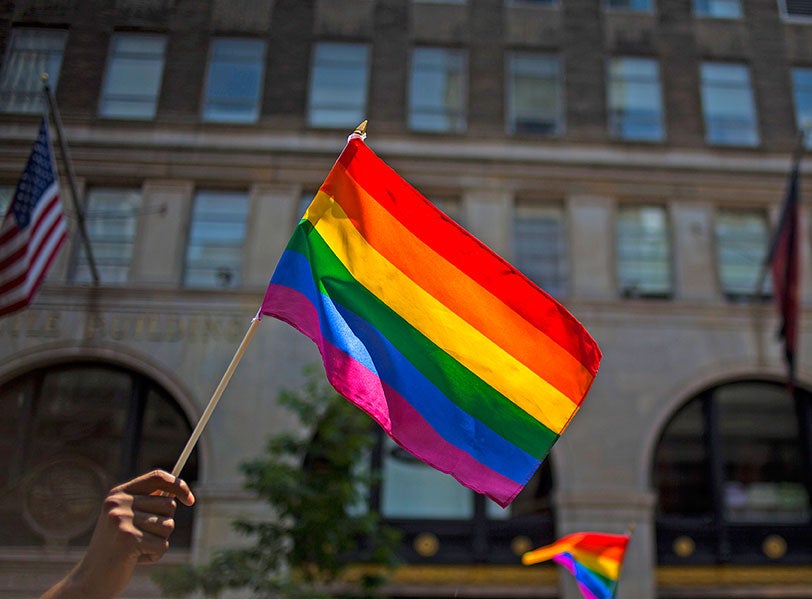
Days into 2018, Nipsey Hussle provided literate people of decency with one of the first celebrity-induced groans of the New Year.
On his Instagram account, the Los Angeles-bred rapper posted a photo of a group of Black men and boys all decked in tuxedos. In the caption, he celebrated what he felt was a different image of Black males portrayed in mass media. Unfortunately, he also made clear that his idea of a more pristine image of Black manhood and Black boyhood was quite limiting.
“Demonstration speaks louder than Conversation,” he wrote. “They gone feed us every image of our men and boys but this one,” he wrote. “No hyper violent…No homo sexual…No abandoners….JUS STRONG BLAC MEN AND YOUNG Men. RESPECT TO MY BIG HOMIE @bigu1 for Leading with love and intelligence. GOD IS WITH US WHO CAN GO AGAINST US ??”
The quote reminded me of folklore I’ve heard in barbershops, churches, and classrooms from strangers, former friends, and even family members: the notion that it has suddenly become “cool to be gay.” It’s an idea, which has since expanded to include trans people, queer-identifying, or any other type of person that deviates from heteronormativity and what constitutes traditional gender binaries, that society suffered a moral decline, and as a result, those of us who would otherwise be ostracized are now embraced by society at large.
It’s something I’ve heard my entire life that has been confounding for varied reasons. Slowly but surely, the masses are grasping that their rigid definitions of gender and sexism, crafted by theism, patriarchy, and the like might need to be widened, or if nothing else, the space to be challenged. What mostly frustrates me, though, is that for all this talk of how “cool” it is to be LGBTQ, there is plenty of data to suggest the opposite.
In fact, two new studies show that while yes, progress has been made, prejudice abounds, and in some cases, has dire consequences for many of us.
The first comes from the National Coalition of Anti-Violence Programs, who has recently released its annual report. In their findings, they note that anti-LGBTQ homicides in the United States rose 86 percent in 2017, compared to the previous year. The report, as highlighted by The Huffington Post, found “52 instances of anti-LGBTQ homicides in 2017, and 28 in 2016, but this count does not include the Pulse Nightclub shooting that killed 49 people in 2016, as it only calculates single-incident homicides.”
Of the total number of homicides last year, the report finds that 71 percent of the victims were non-white compared to 23 percent white victims. You can read the full report here. Unsurprisingly, the group, a coalition of 40 various community-based anti-violence groups, noted that the rise coincided with the end of the presidential cycle.
Although most of Donald Trump’s venom has been relegated to Mexicans, Muslims, women (especially Black women), immigrants from anywhere besides Norway, and anyone else not rich, white, and male, in terms of policy, the administration has been particularly cruel to the LGBTQ community. Despite Roy Cohn, a gay man who died of AIDS, being his mentor, the Trump administration has declined to recognize June as National LBGTQ Pride Month; his vice president, Mike Pence, is a staunch anti-gay politician; the same goes for his nominee to the Supreme Court, Neil Gorsuch; he attempted to ban transgender people from serving in the military; despite numerous calls, his administration failed to condemn anti-LGBTQ violence in countries like Egypt, Chechnya, and Indonesia.
That lack of moral leadership has had a notable impact on society.
In an ongoing poll commissioned by the LGBTQ rights organization GLAAD, their survey, which began in 2014, reveals that a growing number of non-LGBT Americans have expressed being less comfortable with their LGBTQ neighbors. These are people who say they don’t want LGBTQ people in their faith communities; having them as family members; having them serve as teachers; as doctors; or seeing same-sex couples holding hands. Likewise, those who have said that they have experienced discrimination based on their sexual orientation or gender identity soared 11 points.
John Gerzema, CEO of the Harris Poll, which conducts the study, is quoted in the Washington Post as suggesting that Americans are taking advantage of an environment in which audacious displays of bigotry and prejudice has become more permissible. Yet, the myth that it’s so “cool” to be one of us remains at every needed rise in LGBTQ visibility, or in the case of Nipsey Hussle and those like him, whenever cis-gendered heterosexuals either want to pretend to be about positive portrayals of members of the Black community when in actuality, they’re merely buying into a specific idea of what makes a man or a woman.
Oddly enough, it’s an idea largely derived from those who use similar imagery to demean and devalue us.
As a gay Black man, while I know there has been some advancement, I’ve never kid myself of potential danger tied to my identities. The LGBTQ community is indeed cool because we birth so much into culture, but that has never blinded us to our lingering collective marginalization. Those of us who know what it’s like to be oppressed for no other reason than being who we are would be better served using their platforms and voices to uplift all of us rather than repeating the mistakes of our oppressors.
The inability to do so is to contribute to the greater problem, which can sadly, lead to the death of many of us.